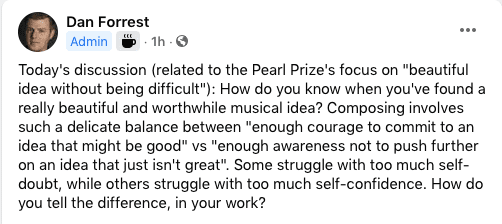A few days ago, composer Dan Forrest asked a great question in the American Choral Composers Forum:

These are two great questions:
- How do you know you’ve found “a really beautiful and worthwhile musical idea”
- How do balance the “courage to commit to an idea that might be good” vs. “enough awareness” to abandon an idea that “just isn’t great”?
I’d separate out the two parts.
“Beautiful ideas” consist of (1) beautiful (or compelling) sounds (2) made into meaningful ideas.
Compelling Sounds . . .
Finding beautiful or compelling sounds isn’t that hard.
They often come as the result of free play or instinct.
Besides the conventionally beautiful (e.g., major seventh chords, well-placed suspensions, etc.), beautiful sounds elicit an obvious, gut-level reaction.
When you find yourself suddenly enticed by a sound — and when that captivation holds for more than a few days — it’s probably beautiful.
Find Compelling Sounds—Today
When have you noticed this in your own composing? That sudden sense of “Wow! That’s cool!” or “Oh, my goodness! That was stunning!”? That feeling is a major clue that you’re onto something good.
Sometimes composers wait to take action until they feel that feeling.
This is a big mistake.
The fastest way to find compelling new musical sounds is by making lots of new musical sounds.
👉 So start today by deciding what kind of sound you want (a melody? a harmony? a texture?). Then, make a dozen simple prototypes.
As you do so, pay attention to your gut: where is it being drawn? This is your hint that you've found an idea worth pursuing.
. . . Made into Meaningful Ideas
Though finding beautiful sounds may be easy, developing beautiful sounds into meaningful ideas IS often hard.
By “hard,” I mean “takes a deliberate, sustained, and thoughtful effort.”
Long-term (i.e., years and decades), composers develop a sense for what is meaningful generally through curiosity about life and people and specifically through years of analyzing and performing lots of other music. There is no shortcut for this never-ending work.
Short-term (i.e., weeks and months), composers develop self-compassion for their half-baked ideas through two simple maxims:
- The full meaning of an idea is *never* clear in the first draft.
- Inspiration is an ongoing revelation, not a one-and-done event.
Composers who believe and trust these facts experience far less self-doubt.
Instead, they just revise. A lot.
In this revision process, they trust that their long-term understanding will reward their short-term persistence with insight about how to hone the meaningfulness of their beautiful sounds.
Make Your Meaningful Ideas—Today
👉 They key to “finding” meaningful ideas is developing the meaning of your current ideas through revision.
These blog posts will help you better understand the revision process and what concrete steps you can take for it:

Don’t Miss Next Week’s Post
Sign up to stay in the loop about my music—and ideas for your own composing!

